Impact
Recent Impact Efforts
GHI in Colombia
Dr. Sam Mossallam, VP Henry Ford Health International, John Zervos, Executive Director, Global Health, and Doreen Dankerlui, Sr. Program Manager, Global Health, recently visited Cali, Colombia, to launch an HPV Vaccination research project in collaboration with Clínica Imbanaco, a large private health system in the city, and the local Department of Health. The team also visited with university and hospital partners in Bogotá where Dr. Mossallam presented on the state of emergency medicine. GHI will collaborate with other HFH departments to expand this work in the future to include implementation of PROMs (Patient Reported Outcome Measures), adaptation of the HFH Zero Suicide Program, development of an antimicrobial stewardship program and student, resident, and faculty exchange.

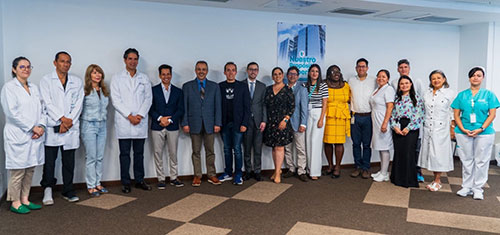
GHI in India

GHI and the Henry Ford Health’s division of Infectious Disease in collaboration with Deenanath Mangeshkar Hospital in Pune, India are piloting a pharmacist-led antimicrobial stewardship project over the next 2 years. Antibiotic stewardship is a systematic effort to encourage the proper use of antibiotics to combat antibiotic resistance. This project is funded through the Merck Investigator Studies Program. GHI team members Siddhesh Veer, MD, Project Coordinator and Sreenidhi Srinivasan, PhD, Associate Scientist, met with partners at the Deenanath Mangeshkar Hospital in February 2024.

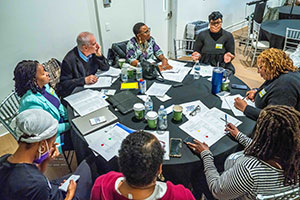
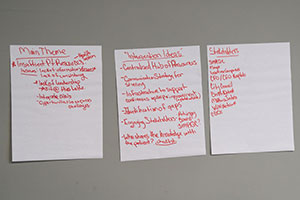
Project HOPE
On Friday, February 9th, the Global Health Initiative, in collaboration with HFH departments of Behavioral Health, Women’s Health and Community Health, hosted local, regional, and global partners for a maternal health workshop. During this workshop, research findings from The HOPE Initiative were presented. This Robert Wood Johnson Foundation-funded project focuses on improving black maternal health outcomes and reducing burnout for healthcare providers.
Participants worked in small groups to discuss the findings and generate ideas for potential interventions to implement at HFH. In addition to TIP–Global Health, who implemented a similar project in Rwanda, representatives from several HFH departments, city and state government, academia, and a variety of community organizations provided their input into this important issue.
GHI in Nepal
GHI members, John Zervos, JD, Executive Director, Sreenidhi Srinivasan, PhD, Associate Scientist, and Siddhesh Veer, MD, Project Coordinator, visited Kathmandu, Nepal in January of 2024. The visit was a continuation of ongoing discussions with multiple project collaborators: GTA Foundation, Nepali Ministry of Health and Population, Shahid Gangalal National Heart Centre, and Manmohan Memorial Medical College and Teaching Hospital. Projects include the Human Papilloma Virus (HPV) vaccine introduction, cervical cancer screening and suicide prevention in Nepali youth. In another project, GHI in collaboration with Henry Ford cardiologists are studying a specific congenital heart defect that causes hypoxia in extreme altitudes in Nepalese Sherpas and the mountain climbing community. Sherpas are renowned for their mountaineering skills and remarkable ability to thrive at high altitudes.



Giving Back to the Community
An estimated 612,000 people in metro Detroit, with nearly one-third being children, face hunger and food insecurity. On December 8, 2023, team members from GHI and International Patient Services (IPS) joined together to address the pressing issue at the local nonprofit Forgotten Harvest.

For over two hours, GHI, IPS and other volunteers from the metro Detroit area rescued 3,245 pounds of various food items, equivalent to half the weight of an elephant. The food surpluses from restaurants, caterers, and other establishments that would have otherwise gone to waste, was delivered to families in need throughout the metro Detroit area.
“Volunteering at Forgotten Harvest was a tremendous experience,” says Surilla Randall, PhD, Manager. “The hours our departments spent sorting, packing and labeling food items will have a direct impact on hunger relief. The Forgotten Harvest staff and facilities were phenomenal.”

“Volunteering at Forgotten Harvest made me realize that there are still so many underserved populations who need these services,” Smith indicated. “Learning about how many people are in need puts my own life and personal problems into perspective and makes me more grateful for what I have. It was a blessing to do something for those in need, especially during this time of year.”
GHI in Colombia
 Doreen Dankerlui, MPH, Program Manager for GHI visited Quibdó, Colombia in July of 2023 to attend the final session and graduation ceremony of a Community-Based Participatory Research course, sponsored by the Universidad de Los Andes (Bogotá, Colombia) and Henry Ford Health. Nursing, psychology, and social work students from the Universidad Tecnológica del Choco participated in this course as well as representatives from several youth-focused community organizations. During the session, participants presented results from their cardiovascular and mental health research and discussed plans for dissemination of research findings and advocacy. Ms. Dankerlui served as a faculty member during the course and will continue to work with local faculty members and students to develop and implement future courses. Institutional funds and donations from Colombian physicians working with HFH supported the program.
Doreen Dankerlui, MPH, Program Manager for GHI visited Quibdó, Colombia in July of 2023 to attend the final session and graduation ceremony of a Community-Based Participatory Research course, sponsored by the Universidad de Los Andes (Bogotá, Colombia) and Henry Ford Health. Nursing, psychology, and social work students from the Universidad Tecnológica del Choco participated in this course as well as representatives from several youth-focused community organizations. During the session, participants presented results from their cardiovascular and mental health research and discussed plans for dissemination of research findings and advocacy. Ms. Dankerlui served as a faculty member during the course and will continue to work with local faculty members and students to develop and implement future courses. Institutional funds and donations from Colombian physicians working with HFH supported the program.
Youth Exploring Healthcare Careers
 On July 24, 2023, GHI hosted teens (ages 15-17) from Bolivia, Costa Rica, and Suriname at Henry Ford Health. Our collaboration with Global Ties Detroit is part of the US Department of State TechGirls program, which empowers young women from around the world to pursue careers in science and technology. The trio, who have an interest in healthcare, visited the Breast Cancer Lab, Infectious Disease Lab, Simulation Center, and the Department of Radiation Oncology.
On July 24, 2023, GHI hosted teens (ages 15-17) from Bolivia, Costa Rica, and Suriname at Henry Ford Health. Our collaboration with Global Ties Detroit is part of the US Department of State TechGirls program, which empowers young women from around the world to pursue careers in science and technology. The trio, who have an interest in healthcare, visited the Breast Cancer Lab, Infectious Disease Lab, Simulation Center, and the Department of Radiation Oncology.
Cardiovascular screening camps in Kathmandu
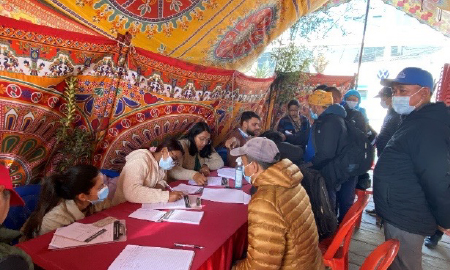
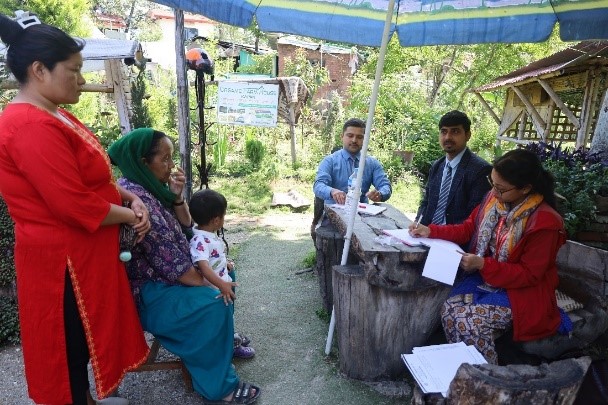
.svg?iar=0&hash=F6049510E33E4E6D8196C26CCC0A64A4)

/hfh-logo-main--white.svg?iar=0&hash=ED491CBFADFB7670FAE94559C98D7798)